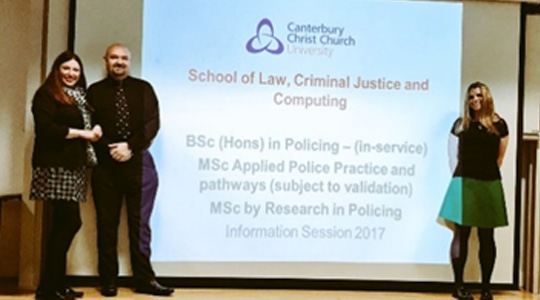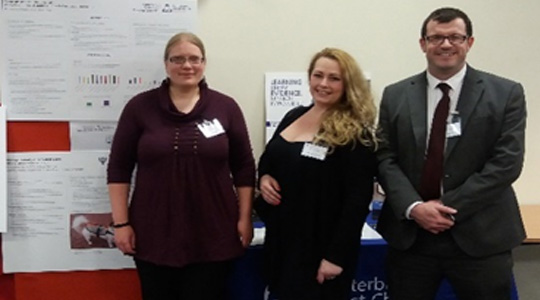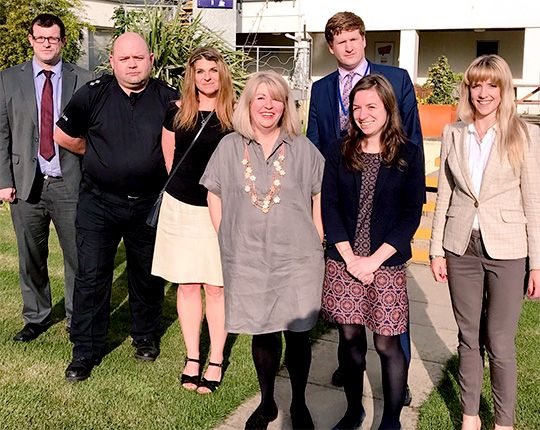05.05.17
Intervention Initiative (Bystander) Pilot Evaluation Project
The Intervention Initiative Pilot Evaluation Project is now well underway led by Dr Sofia Graca, Rashid Aziz, Dr Demetris Hadjigeorgiou and Dr Dimitris Akrivos. A group of Level 4 Applied Criminology students completed a series of 8 sessions on domestic violence and sexual abuse on university campuses. The students also filled in two questionnaires, one before and one just after the programme, on its content and potential impact on them. Nearly 50 questionnaires were gathered in total. The data has been subject to a preliminary analysis and a report submitted to the Student Experience Department and the Expect Respect Delivery Group. This report will inform the decision to roll-out the programme to the university student population as a whole, and what format this will take.
Student feedback has been generally positive in relation to the programme and the participation on the research project itself. Students were happy to be able to contribute to university policy and gained a better understanding, early on in their studies, of what empirical research entails (even if only as participants). The second stage of the programme is now being prepared and it is expected that a series of follow-up interviews will be conducted.
In the meantime, the research team ‘took the pledge’ as part of the Expect Respect campaign, demonstrating their commitment to the project:
05.05.17
Publications announcements
Staff within the School of Criminal Justice & Computing have published the following work:
Antoniou, A.K. and Akrivos, D. 'The Rise of Extreme Porn: Legal and Criminological Perspectives on Extreme Pornography in England and Wales'. London: Palgrave.
Hallenberg, K.M. & Cockcroft, T. (2017) ‘From Indifference to Hostility: Police Officers, Organisational Responses and the Symbolic Value of ‘In-Service’ Higher Education in Policing’, Policing: a Journal of Policy and Practice.
Hallenberg K.M. & Haddow, C. (2016) ‘Beyond Criminal Justice: Connecting Justice and Sustainability’, The Law Teacher, 50(3), pp. 352-370.
Qi, M. (2017) Facilitating visual surveillance with motion detections. Concurrency and Computation: Practice and Experience 29(3)
Wood D., Cockcroft T., Tong S. & Bryant R. (2017) ‘The importance of context and cognitive agency in developing police knowledge: going beyond the police science discourse’ The Police Journal: Theory, Practice and Principles, available on publish first.
17.05.17
Open day for Postgraduate and undergraduate police officer and staff hosted in London
Emma Williams – Deputy Director of CCPR, Richard Honess CCPR Doctoral candidate, Jenny Norman BSc Policing (in-service) Programme Director presenting at one of the information days for prospective students.

Potential students interested in any of our programmes should visit the following link:
17.07.17
Canterbury Centre for Policing Research attends policing research showcase
Earlier this month, colleagues from the Canterbury Centre for Policing Research (CCPR) presented their research posters to 70 middle to senior rank police officers at a research showcase hosted by the British Society of Criminology's Policing Network and the College of Policing.

The five research posters featured work by Professor Robin Bryant, Dr Qi Man, Dr Katja Hallenberg, Dr Katarina Mozova and Dr Steve Tong and covered a range of topics including intelligent detection for cyber forensics, public understanding of counter terrorism strategies and risk management in relation to firearms licensing.
Steve Tong, Director of the CCPR, said:
“This is the first time Christ Church has attend this showcase event. There was a great deal of interest in our work and the opportunity to extend some of our research to other areas of the country. This has been a very worthwhile event and gave us a great opportunity to promote the work the CCPR has been doing in its first 12 months."
23.05.17
Canterbury Centre for Policing Research Mental Health Round Table
On 23rd May the Canterbury Centre for Policing Research (CCPR) in partnership with the England Centre for Practice Development (ECPD) hosted a round table event focusing on Mental Health. On the panel were Michael Brown, Mental Health Coordinator (College of Policing), Matthew Scott, Police and Crime Commissioner for Kent and Madeleine McGivern, Head of Workplace Wellbeing Programmes (Mind). 48 people attended including CCCU staff and students, members of the police and NHS staff.

Each speaker gave a 15 minute presentation and then questions were taken from the audience chaired by Carolyn Jackson, Director of the England Centre for Practice Development.
The mental health round table debate at CCPR in May was excellent. All the speakers spoke eloquently and passionately about their subject areas and the event struck a good balance between the impact on the police of dealing with individuals who suffer from mental ill health, the rise of stress and mental health issues amongst officers, the growing responsibility being placed on the police to deal with these issues and the Kent PCC's response outlining how these factors are being addressed locally. The audience was engaged and asked some great questions. We would have liked to have had more time for discussion. A very successful first round table debate for the centre.”